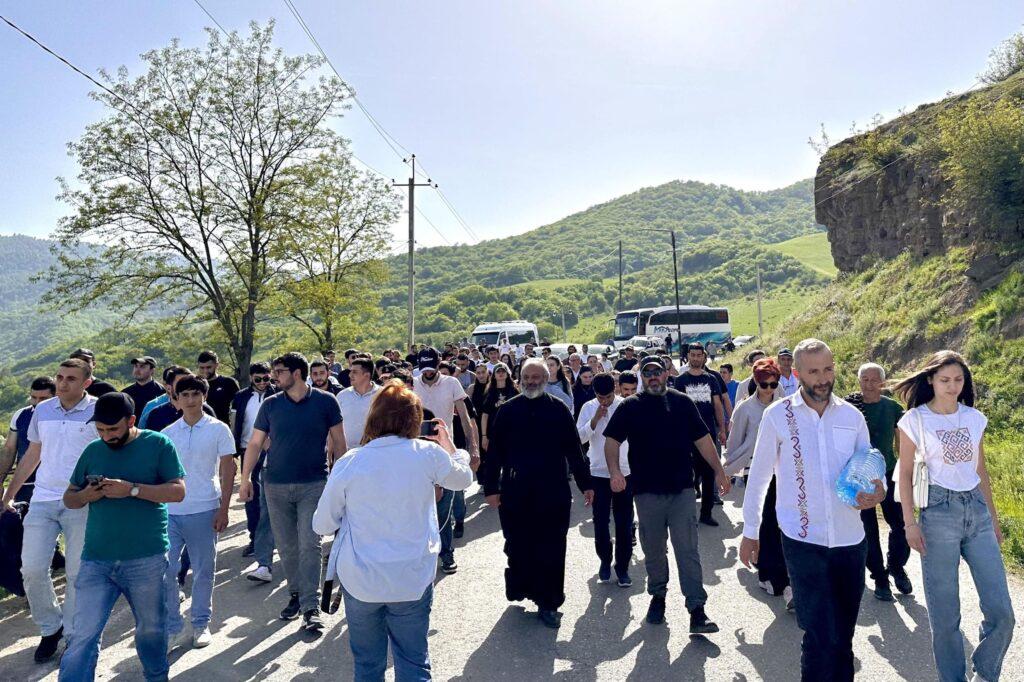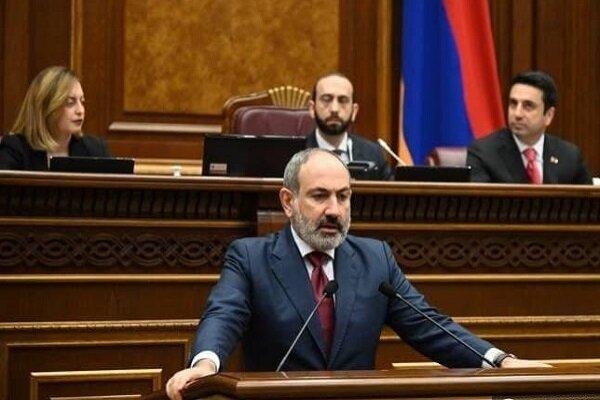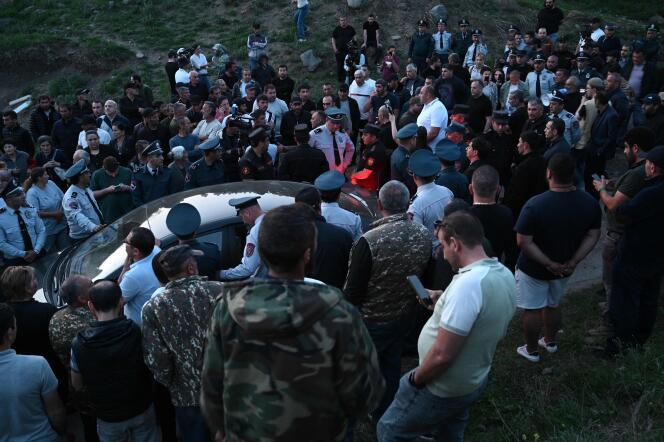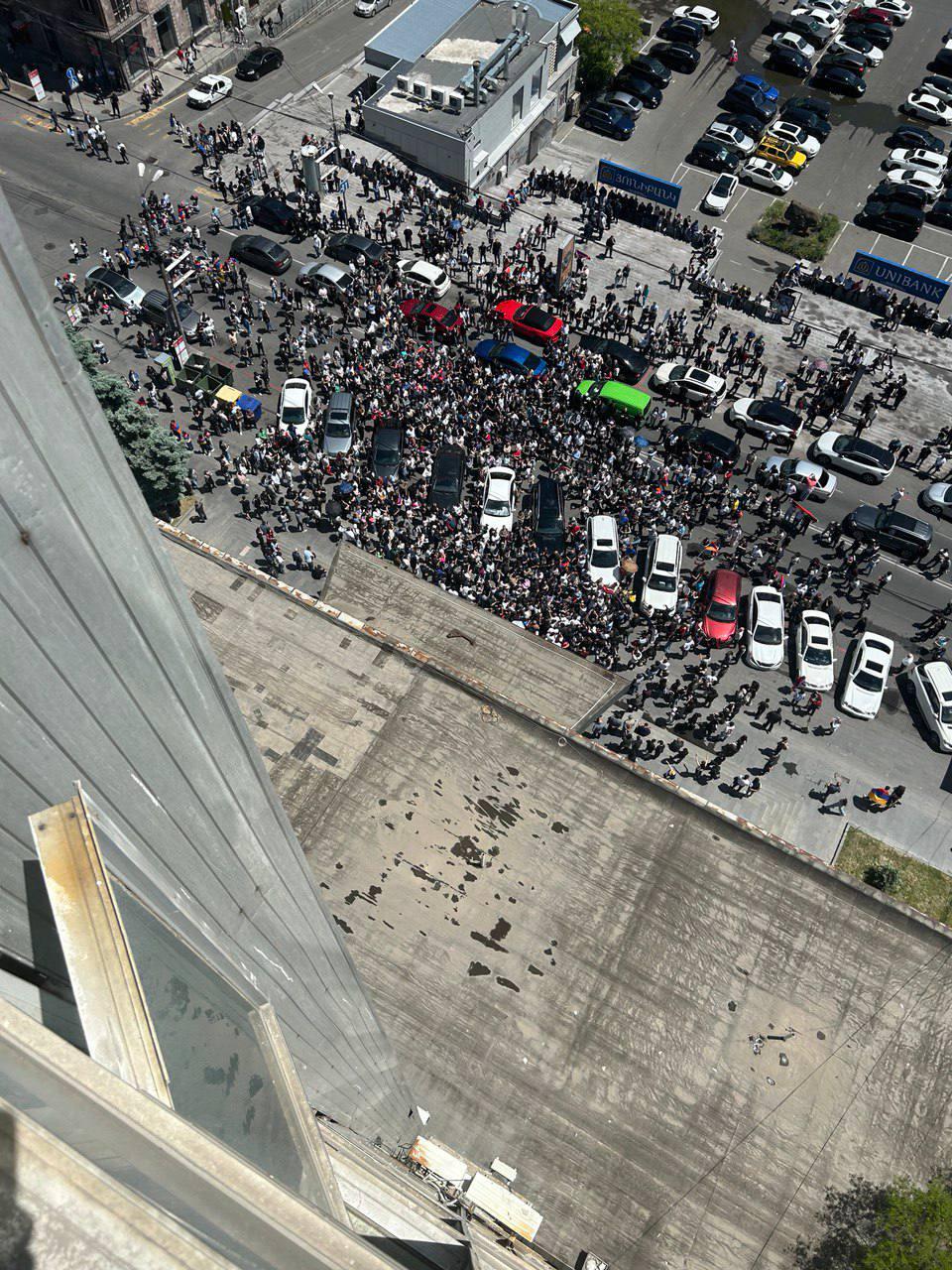Unpacking the ongoing protest & its political implications
Armenia at a crossroads
ANALYTICS 10 May 2024 - 17:57
| Fuad Muxtar-Agbabali |
The massive rally on May 9 in Yerevan's Republic Square, staged by the Tavush for Homeland movement led by Archbishop Bagrat Galstanyan, underscores a critical moment in Armenia's political landscape. With an alleged 60,000 participants protesting the government's border demarcation deal with Azerbaijan, the protest signifies widespread discontent and opposition to Prime Minister Nikol Pashinyan's leadership.
The protest of pro-Russian opposition forces and the Armenian Church has galvanized a substantial number of protesters, a phenomenon not witnessed in the past three years. This surge poses pivotal questions about the movement's endurance and strategic efficacy.
Archbishop Galstanyan, speaking at the rally, vehemently demanded Pashinyan's resignation, accusing him of mismanaging the country and unilaterally conceding to Azerbaijan in the demarcation process. The call for civil disobedience, extending to universities and businesses across Yerevan and provinces starting from May 10, demonstrates the movement's determination to escalate pressure on the government.

At the heart of evaluating the protest's impact lies the inquiry into whether the opposition and the church can escalate beyond large-scale rallies to induce urban paralysis, effectively disrupting state activities. Previous protests in Armenia often lost momentum after initial shows of strength, highlighting the challenge of sustaining traction beyond symbolic gatherings.
The response from state institutions, particularly law enforcement, will prove decisive. The government's ability to consolidate support within parliament and navigate law enforcement actions will profoundly influence the trajectory of the protest movement.
For Prime Minister Pashinyan, the ongoing protest represents a watershed moment. The opposition's adept leveraging of public discontent amid the demarcation process presents a pivotal challenge. Nevertheless, Pashinyan remains resolute, rejecting calls for resignation and countering opposition manoeuvres.
Adding complexity to the situation is the West's steadfast support for Pashinyan's legitimacy. Despite potential disruptions to negotiations with Azerbaijan, Western backing of Pashinyan underscores the geopolitical investment in individual leadership over institutional alliances.
Amidst these developments, internal power dynamics within Armenia are pivotal. Pashinyan's ability to maintain loyalty within his parliamentary faction, bolstered by opposition rhetoric inadvertently solidifying party unity, is paramount. The prospect of snap elections remains remote, underscoring Pashinyan's resolve to weather the storm.

The broader geopolitical context, especially concerning Azerbaijan, introduces additional layers of complexity. While protests may disrupt negotiations, there exists a paradoxical possibility of Western support coalescing around Pashinyan to stabilize Armenia's position vis-à-vis regional dynamics.
In parallel, Prime Minister Pashinyan has sought to reaffirm his alignment with national values, particularly emphasizing his acknowledgment of the Armenian Apostolic Holy Church alongside other Christian denominations. This strategic move aims to appease supporters of Archbishop Bagrat Galstanyan and underscores Pashinyan's religious affiliation amid tensions with the Church.
However, past conflicts between Pashinyan and the Church, exacerbated by anti-Church sentiment within his administration, complicate this narrative. The exclusion of the New Year message of Catholicos Garegin II from Armenian Public TV underscores strained relations between the government and the Church.
Moreover, speculations abound regarding the ruling Civil Contract party's cautious stance toward inflammatory remarks about Archbishop Galstanyan's protests, cognizant of the potential to escalate public discontent. The specter of early elections looms as a pre-emptive measure against a parliamentary vote of no confidence in the prime minister.

Separately, criticism of the Armenian Church's involvement in protests against border demarcation by figures like Arman Babajanyan of the For the Republic Party reflects a broader political narrative. Babajanyan condemns the Church's role as a "deformation of the political field," attributing political ambition and disruption of diplomatic processes to the Church's actions.
Babajanyan's call for national unity underscores the imperative of solidarity in strengthening Armenia's negotiating position. This discourse underscores the complex interplay between religion, politics, and national identity in Armenia, reflecting deeper societal tensions amidst ongoing geopolitical challenges.
The ongoing political tumult in Armenia, exemplified by figures like Archbishop Bagrat Galstanyan and former president Robert Kocharyan, presents a significant challenge to the Pashinyan government. Despite recent street protests failing to unseat Pashinyan, attention has shifted to potential parliamentary strategies for his removal.
The opposition's lack of a coherent political strategy, glaringly evident after the May 9 rally where demands for Pashinyan's resignation predominated without clear alternative visions, underscores the complexity of the current political landscape. The shift toward parliamentary manoeuvres, particularly a motion of no confidence, presents internal challenges within the opposition's ranks.

The arithmetic of parliamentary support is pivotal, with the opposition requiring 36 votes merely to place a no-confidence resolution on the agenda. However, the current parliamentary balance suggests substantial hurdles for the opposition, even if they secure the necessary signatures.
Moreover, the necessity of proposing a new prime ministerial candidate concurrently with the no-confidence motion adds further complexity. The need for a universally acceptable nominee, capable of bridging opposition factions and appeasing protesters, underscores the intricacies of opposition cohesion.
The potential candidates speculated upon, such as Bagrat Galstanyan, highlight the nuanced political maneuvering at play. Each candidate's alignment with various opposition factions and their ability to garner support within and beyond parliamentary lines will determine the feasibility of any no-confidence motion.
Beyond parliamentary strategy, the broader opposition agenda remains nebulous, with a focus on leveraging public pressure - especially through displaced individuals from Karabakh - to influence government policy. This approach underscores the intersection of political and humanitarian concerns within Armenia's evolving political landscape.
In essence, the unfolding events in Armenia underscore the challenges facing both the Pashinyan government and its opposition, characterized by intricate parliamentary tactics, factional alignments, and the enduring significance of individual leadership in shaping global alliances and geopolitical outcomes. The convergence of opposition forces, the role of religious institutions, and the government's response will define Armenia's trajectory in the coming days, underscoring the intricate dance of power and influence in the nation's political theatre.
Caliber.Az
|
1
|
Uncertainty over Russian border guard withdrawal from Armenia Amid conflicting statements
18 May 2024 - 14:47
|
|
2
|
Giant meteor seen lighting up skies of Portugal
19 May 2024 - 13:11
|
|
3
|
Baku's 8-0 victory Diplomacy of sovereignty
20 May 2024 - 17:53
|
|
4
|
Türkiye, Greece forge new geopolitical axis Amid historical rapprochement
20 May 2024 - 16:04
|
|
5
|
Iranian president's helicopter makes hard landing on border with Azerbaijan
19 May 2024 - 17:25
|
Many world leaders died, few survived in aviation accidents since 1936
21 May 2024 - 01:12
New Covid variants stoke fears of a summer surge in cases
20 May 2024 - 23:00
Russia ready to assist Iran in helicopter crash investigation
20 May 2024 - 21:21
Azerbaijan, Georgia conduct inter-ministerial political consultations in Baku
20 May 2024 - 21:14
Iran’s Chief of Army Staff orders probe into Raesi helicopter crash
20 May 2024 - 21:06
Iranian President Raisi's funeral to be held on May 23
20 May 2024 - 21:02
Turkish president speaks with Iran’s interim president
Extends condolences over Raisi’s death20 May 2024 - 20:59
UN chief extends condolences to Iran over deaths of president, FM
20 May 2024 - 20:56
Azerbaijan, Latvia strengthen parliamentary ties, mull regional cooperation
PHOTO20 May 2024 - 20:41
Armenia launches construction of new road to Kirants
As part of border demarcation with Azerbaijan20 May 2024 - 20:33
Israel slams ICC arrest warrants against Netanyahu, Gallant for Gaza war crimes
20 May 2024 - 20:26
Armenian emigration driven by desire to avoid military service
PM says20 May 2024 - 20:11
WikiLeaks founder Assange wins right to appeal against extradition order to US
20 May 2024 - 19:59
Zangilan, Shayifli hydroelectric power plants set to produce clean energy
20 May 2024 - 19:48
Rafah exodus passes 810,000
UNRWA says20 May 2024 - 19:33
First stage of resettlement: 3,146 residents to return to Minjivan settlement
20 May 2024 - 19:26
Türkiye "neutralizes" 3 PKK terrorists in northern Iraq
20 May 2024 - 19:19
Will foreign troops save Ukraine?
Caliber.Az on YouTube20 May 2024 - 19:10
Erdogan: Türkiye eradicated tradition of coups
20 May 2024 - 19:04
Media tour of Zangilan HPP showcases Azerbaijan's renewable energy development
PHOTO20 May 2024 - 18:52
Azerbaijan, Belarus forge agro-industrial cooperation framework
Review by Caliber.Az20 May 2024 - 18:40
China sanctions Boeing, two US defence contractors for Taiwan arms sales
20 May 2024 - 18:28
Azerbaijan invites Israeli companies to invest in Karabakh
20 May 2024 - 18:15
Italy appoints new ambassador to Azerbaijan
20 May 2024 - 18:03
Baku's 8-0 victory
Diplomacy of sovereignty20 May 2024 - 17:53
Police detain revanchists near Armenian border village
20 May 2024 - 17:51
Azerbaijani minister, Latvian Parliament speaker discuss COP29 preparations
20 May 2024 - 17:39
Azerbaijan, Latvia strengthen pledge to enhance bilateral relations
20 May 2024 - 17:27
UK intel: Russia may bring back labour conscription
20 May 2024 - 17:16
Slovaks debate if Fico will seek vengeance after assassination attempt
Article by Financial Times20 May 2024 - 17:05
“Minsk proves its status as a reliable partner for Baku”
Belarus pundit on Caliber.Az20 May 2024 - 16:53
Top 10 countries importing Azerbaijani oil
20 May 2024 - 16:43
US reaches agreement with Niger to withdraw military forces by September 15
20 May 2024 - 16:41
Pacific civil society calls for UN intervention in New Caledonia crisis
20 May 2024 - 16:29
ICC prosecutor seeks arrest warrant for Israeli and Hamas leaders
Including Netanyahu20 May 2024 - 16:17
Türkiye, Greece forge new geopolitical axis
Amid historical rapprochement20 May 2024 - 16:04
Baku hosts Azerbaijani-Tajik business forum
Documents signed / PHOTO20 May 2024 - 15:52
ANAMA clears 308.7 hectares of mines, unexploded ordnance
20 May 2024 - 15:40
Great Return to Jabrayil: Initial phase to relocate over 3,000 residents
20 May 2024 - 15:28
MFA: Baku reaffirms support for One China policy, rejects Taiwan independence
20 May 2024 - 15:27
